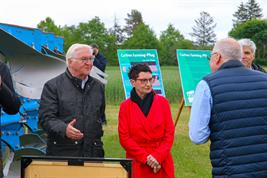08.05.2024
Press Release

Climate change, biodiversity loss and, most recently, war and pandemics: Agriculture is facing numerous challenges. The Leibniz Center for Agricultural Landscape Research (ZALF) is researching solutions. Federal President Frank-Walter Steinmeier came to see for himself how sustainable agriculture can be shaped. On May 7, 2024, he visited the ZALF campus in Müncheberg together with Dietmar Woidke, Minister President of the German federal state Brandenburg.
Federal President Steinmeier and Minister President Woidke began their visit to ZALF on the experimental areas of the campus in Müncheberg. There, a research team presented the patchCROP landscape experiment, in which the use of agricultural robots and drones for weed and pest control is being researched. In contrast to the widespread cultivation model, in which a single plant species is cultivated on a large area, the patchCROP project uses small fields to grow a variety of crop rotations and suitable plant species depending on the soil conditions.
The two politicians then visited a "carbon farming" plow developed at ZALF together with a practice partner, which can increase soil fertility and protect the climate. The Federal President was impressed by the potential of this technology to store CO2 in the soil in the long term.
Researchers then explained the cultivation and marketing of pulses, from chickpeas to soybeans and field peas, on the experimental plots. These plants can accumulate nitrogen from the air in the soil, thus acting as a natural fertilizer and are a valuable source of vegetable protein in the diet. A ZALF research team is working to increase the cultivation and marketing of pulses in Germany.
After visiting the trial areas, Steinmeier and Woidke visited a ZALF laboratory to find out about the potential of amorphous silicon for improving the soil. Fertilizing with silicon improves the water storage capacity of the soil and helps plants to survive periods of drought.
Workshop discussion shows variety of solutions
Alongside the visit, representatives from research institutions, foundations and associations from the fields of environmental protection, agriculture, business and innovation promotion as well as the food industry exchanged ideas. In a workshop discussion, the participants discussed their experiences and solutions for greater sustainability and climate protection in agriculture. The approaches ranged from the promotion of ecosystem services to technical innovations. Dr. Karin Stein-Bachinger from ZALF contributed her expertise on organic farming and environmental protection in agriculture. The Federal President and the Minister President came together for a concluding round of discussions with the experts at the workshop.
Exchange between research and practice
Federal President Steinmeier summarized his insight into the research at ZALF and the exchange in the workshop discussion: "We looked at what the challenges are for agriculture in the era of climate change, how we can manage with less CO2 emissions, how we can increase biodiversity and create yield security for farmers." According to Steinmeier, the exchange between ZALF and agricultural businesses in the region is "a good opportunity to show that change is taking place, especially in agriculture, especially in rural areas, and that change is succeeding."
Minister President Woidke emphasized the "huge advantage for the state of Brandenburg" of having a research institution on site with ZALF, "whose research has a direct impact on Brandenburg farms, is available to them and in which the farms are involved."
 Press Release as PDF
Press Release as PDF
Further information:
